 | |
| |
第三十六回 「Rupa
Cooking」
文:Logan
Davenport 写真:Kiyomi & Yuko
Not many times does a man living in
Japan have an opportunity to attend a cooking class during the middle of the week,
so when I decided to attend a Wednesday class on Indian cooking, I pretty much
knew I'd be the only man attending the class. I was, but no problem. I had learned
earlier that the class would be taught by a woman named Rupa and that it was to
be her final such class in Japan. I learned that she and her husband were moving
to South Korea, so I knew that this would be my last chance to attend one of her
classes. I was thankful I had the opportunity.
Outside of a few of
the major cities in America, we Americans have very little opportunity to experience
"real" Indian cooking. I should say "good Indian cooking,"
to be more precise. To be thoroughly accurate, regarding most American cities,
I should say "any authentic Indian cooking." Spices, vegetables, and
other ingredients commonly used in the preparation of authentic Indian dishes
are in fact rare and difficult to find in most American cities with few exceptions.
The weather was perfect the day of the class. I caught the bus from Yokohama station
and waited for our teacher, Mrs. Rupa, to arrive. I met a few others who would
be attending the class while we were waiting. We were met by our teacher and escorted
to her home, which, conveniently, was a short walk from the bus station.
Once we arrived everyone was asked to have a seat on the sofa, while Mrs. Rupa
prepared a mango drink for each of us. She was very courteous to us all. The mango
drink was very nice. Everyone seemed very relaxed and casual. I gathered quickly
that a few of the students had attended her classes before, so they were familiar
with both her home and Mrs. Rupa's kitchen. I more or less just watched and learned
as they gathered around her in the kitchen to begin the lesson. I felt that the
women attending the class were very accustomed to taking part in such classes
whereas I was a bit hesitant. I've attended a couple of other classes, African
cooking, with Miki's Kitchen, and I was more talkative and open during those.
For some reason, during this class, I just wanted to hang back, observe, and take
notes. I did ask questions, however, whenever Mrs. Rupa would introduce something
about Indian cooking with which I was totally unfamiliar. I had no idea what ghee
was, for example. I'm sure many people know about ghee, but I did not. I was very
interested in learning about new ingredients and methods of preparation.
Perhaps the real reason I was a bit hesitant to jump right in with the others
was Mrs. Rupa's introductory segment. She showed the ladies there a centuries-old
Indian beauty secret. It was a simple recipe using glycerine, lemon juice, and
rose water. Of all things, it was used to enhance the beauty of one's skin. Actually,
I thought my skin could use a more than its share of quality enhancement with
the ravages of time and all glaringly manifest on my own visage, but nahhh, why
bother? The fight's over, time's won. The referee has waved his hands and stopped
the bout. Anyway, I held back a little from that portion of the lesson, already
being more than a little self-conscious of that fact that I was the only man in
the room. The cooking portion of the class then began.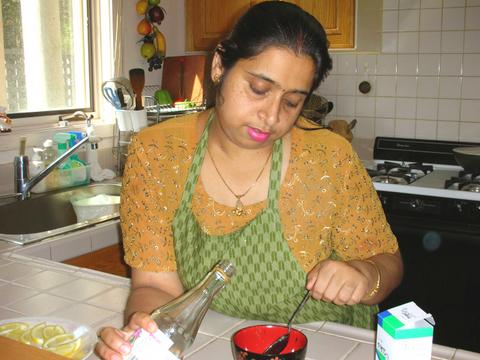
One of the more interesting qualities of the classes Niki's Kitchen offers is
that they work to expand one's knowledge of the world. I always find that very
interesting. I'm often surprised by how rapidly in the modern, international business/techno
environment both information and technology spread around the globe. Music, movies,
literature, medical technology, findings of researchers in all areas of science,
electronic achievements and other modern creations leap from nation to nation
almost instantly. It's interesting how ghee, turmeric, kewra, garam powder, basmatic
rice, and tandoori masala just don't seem to have found a place on the shelves
of my local supermarkets back home in the States. Well, OK, turmeric powder is
there, and one can hunt and forage around specialty shops for the other ingredients,
sometimes locating them, other times not; however, I'd be willing to bet that
most home cooks in much of the Western world would be hard pressed to identify
by name those ingredients listed, much less what they are used for, with, or in.
It seems the information related to science and entertainment travels more successfully
trans-culturally than does culinary information and taste.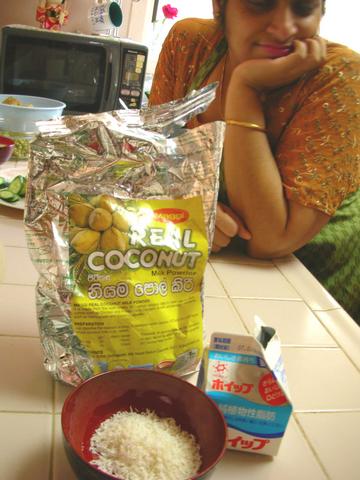
Anyway, I was very pleased to learn about Mrs. Rupa's recipes and to watch her
method of preparation. I learned that she also used an interesting chopping board
for rapidly slicing vegetables. We have such boards in America, too. The tip of
the blade used with such boards is attached to the center of the board and pivots
around as one slices -- very convenient. But the Japanese women attending the
class seemed unfamiliar with such boards. That was interesting, too. Not only
the ingredients but also the tools used in preparation of dishes vary from culture
to culture. I enjoyed studying the methods Mrs. Rupa employed to do what might
seem to be even the most routine of tasks, noting a few cultural differences that
seem to never migrate from one culture into another.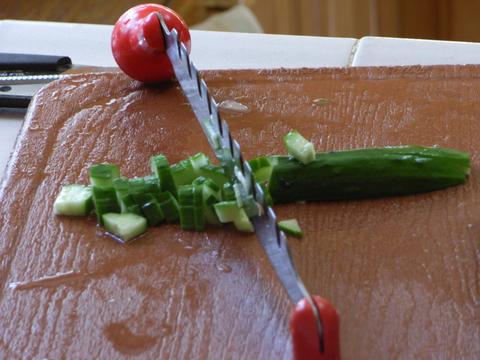
The choice of dishes Mrs. Rupa prepared was excellent. We watched and assisted
her in preparing a mutton biryani, vegetable kebabs, an onion and cucumber raita
using yogurt, and finally some homemade Kulfi. Kulfi is Indian ice cream, and
she used almond and pistachios, as well as cardamon and saffron as flavorings.
The mutton biryani was the main dish and was surprisingly easy to prepare. Of
course, the majority of the effort involved the slicing and preparation of the
main ingredients used -- onion, tomatoes, boiled eggs and the mutton. Various
spices were used, some Indian, others commonly found in most kitchens. The vegetable
kebabs were supposed to be prepared by coating them with a tandoori marinade and
then refrigerating them overnight. We were shown all the steps involved and then
we grilled several ourselves. These kebabs were served with green chutney and
salad. I enjoyed taking even a small part in preparing these foods, as did the
other students present.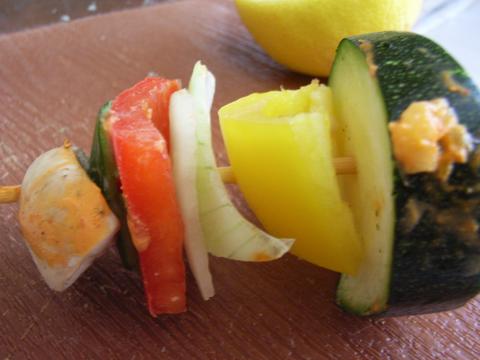
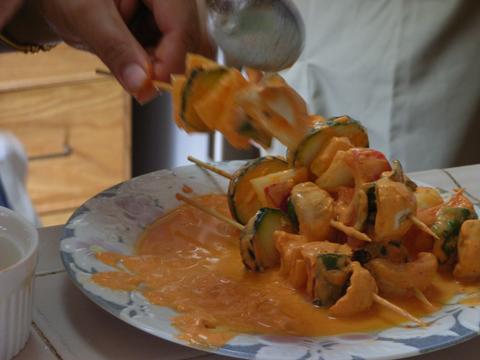
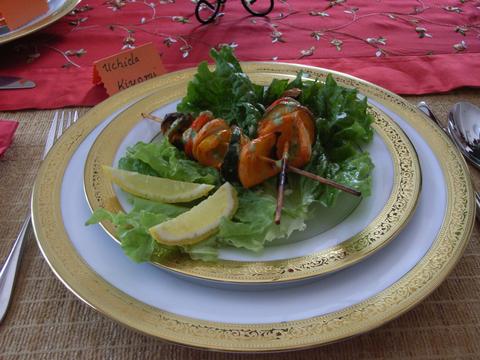
After all had been prepared, Mrs. Rupa and the students set up the table in a
very nice manner. I have to say that the mutton biryani and the vegetable kebabs
were delicious. The kulfi ice cream dessert was surprisingly good. Given the ingredients
used in the preparation of the kulfi, I couldn't imagine well how it would taste,
but it was very nice. We had another mango drink with the meal. During the meal,
we all enjoyed a cordial, friendly, an open conversation. It was really during
the time we were enjoying the dishes before us that we had an opportunity to learn
much more about Mrs. Rupa and about India. She spoke at length on many very interesting
topics, some related to cooking, others just various covering many subjects the
students brought up about life in general. I believe everyone there was having
a very nice time, and we all certainly seemed to be having a very good afternoon.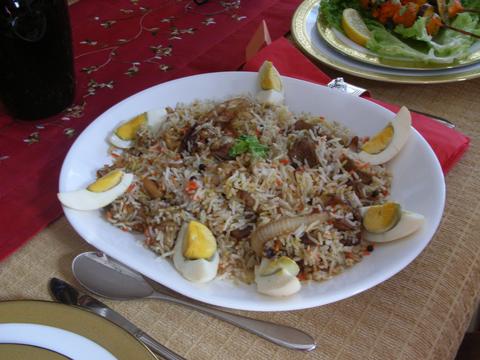
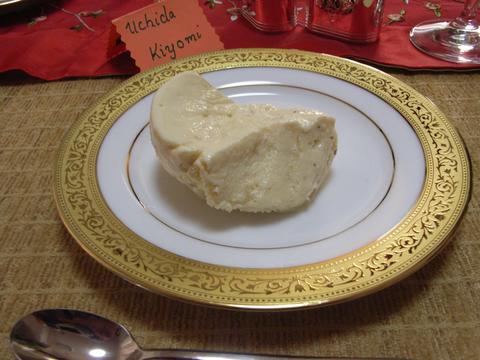
It's unfortunate that I'm unable to recommend Mrs. Rupa's class specifically because
the class I attended was to be her final one in Japan. That's too bad; however,
I'm certainly interested enough in learning about the foods of foreign cultures
to want to attend more such classes in the future. Indian cooking appeals to me
very much, but which style I'll wish to try next will be a difficult choice for
me make. It's all so new and unfamiliar... and good! 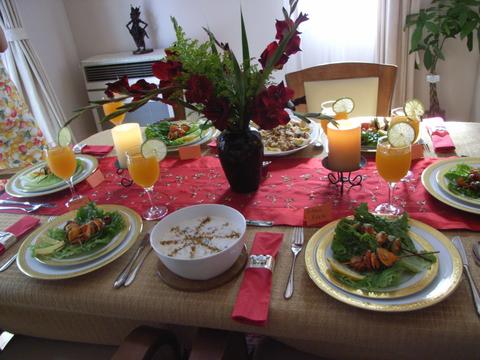
Profile:
My name is Logan Davenport. I'm an American living
Japan. I've been
writing part-time for more than 15 years. I've written on
a myriad of
subjects and in many diverse styles and voices. I've done speech
writing
for public figures. I've worked editing scientific papers, and I've
written fiction, including some series of children's stories and general
fiction.
I've worked with a Christian publishing company involved in
writing textbooks
for home schooling. I enjoy writing on a wide-range of
subjects and am currently
working on several items regarding my experiences
and my life in Japan. I've
written several books of humor, as well.